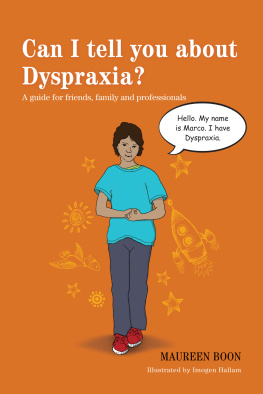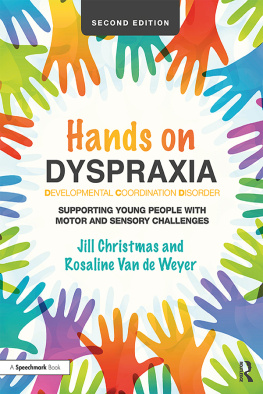Waiting for a Voice
The Parents Guide to Coping
with Verbal Dyspraxia
by
Sam Walker
www.emeraldpublishing.co.uk
Emerald Guides
Sam Walker 2015
All rights reserved. No part of this book may be reproduced in a retrieval system or transmitted by any means, electronic or mechanical, photocopying or otherwise, without the prior permission of the copyright holder.
British Library Cataloguing in Publication Data. A catalogue record for this book is available from the British Library.
ISBN: 978-1-84716-482-7
ISBN ePub: 978-1-84716-543-5
ISBN Kindle: 978-1-84716-542-8
Information in the nutrition chapter kindly provided by Katharine Tate.
Printed by Grosvenor Press London
Cover design by Bookworks Islington
This book reflects the ideas and opinions of the author, with the purpose of highlighting information on the topics covered in the book. It is not meant to provide health or medical evaluation, consultation or advice, and the reader is advised to consult appropriate health, nutritional and medical professionals for these services. The author and publisher therefore take no responsibility for any personal risk or loss.
This book is dedicated to the following people:
To Sue, a brilliant speech and language therapist, for being by our familys side every step of the way, and for helping Monty to find his voice.
To Katharine, my good friend, excellent nutritionist, and fish-oil provider. Thank you for everything, including the chickpea pasta.
Contents
***************
Foreword
Working with Monty has been an amazing journey, which has involved many giant leaps forward and some small steps back along the way. His family have moved mountains to identify and implement a whole host of interventions that are collectively impacting on Montys development. Sharing their experiences, understanding and awareness with other parents may prove hugely effective at making a real difference for so many others in similar situations.
This book is an honest, easy-to-read guide for those who are coping with verbal dyspraxia, including an up-to-date understanding of the disorder and identification of support strategies. Sam is a parent who is dealing with the disorder day-by-day and is working with a range of healthcare professionals and teachers to ensure all interventions that are deemed suitable are in place. This is a must-read for all parents who are also Waiting for a Voice.
Katharine Tate
Nutritionist and Owner of The Food Teacher
(BEd (Hons), FAETC, Dip ION (Distinction), BANT, CNHC)
Katharine Tate is a qualified teacher, nutritional therapist, mum, and entrepreneur who has over 20 years experience working with children in both primary and secondary schools in the UK, New Zealand, and Hong Kong. She has founded The Food Teacher brand to combine her passion for education and nutrition to deliver a healthy childhood, focusing on promoting family health through food and lifestyle.

INTRODUCTION
Imagine this, if you will.
About eighteen months ago I found myself sitting in an NHS speech therapy clinic room. It was a baking hot August day outside, there was only one window partially open in the room and everyone was fanning themselves with paper to create some breeze. My son, Monty, had just turned three and was there because he wasnt talking, and after various battles in actually getting him seen at the clinic, here we finally were. There were two Speech and Language Therapists (SaLTs) in the room, one asking Monty to do things (Give the crocodile some dinner, Monty - does he want sausages or pizza?), and the other therapist helping him to do as he was being asked. They were both nice and smiley, and Monty was quite happy and relaxed; there were lots of new and interesting toys to play with, and he did his best at imitating the animal noises that they wanted him to do (Can you say ahhhh, Monty? What does the crocodile say when he opens his mouth?) I, on the other hand, was a bundle of nerves - theres nothing like wanting your child to perform as expected when faced with a room of professionals and scribbling pens writing on clipboards.
Even though my husband and I knew that things werent quite right with Montys speech - we already had an older son and were therefore aware of the general milestones and what might be deemed to be normal speech production in children - we still wanted someone to put our minds at ease and to tell us that there was nothing to worry about. Id taken Monty to the doctors twice in the previous six months, and both times was told that he was a) a boy, and boys were often later to talk than girls, b), that he had an older sibling which had a tendency to make younger siblings late talkers due to having another small person to communicate their needs for them, and c), that the doctors own son had been a late talker and hadnt spoken his first words until three years old. It also didnt help that Monty had made an attempt to say the word spider, completely randomly, in front of her on the second visit. Look hes said a word! Nothing wrong with him, then! Case closed, and so out the door we went.
A self-referral a few months later to the health visitor resulted in a hearing test at the Audiology clinic, which showed that Monty had excellent hearing and therefore ruled out any hearing problems or ear complications like glue ear. The Audiologist, however, noted that Montys speech was not very clear - I think she was being polite - and from then on, after several months on a waiting list, we found ourselves in this hot and stuffy room in the Speech and Language Unit.
After about forty-five minutes, and after many pages of notes had been taken, the lead therapist turned to me and said that it was clear that Monty had a speech disorder, most probably something called developmental verbal dyspraxia. She asked if Id ever heard of it - I said I hadnt. She then asked if I had any questions. Many thoughts were racing through my mind - the whats, the whys, but I went with a hopeful, I see. But - itll resolve itself, right? Over time?
Ill never forget the look of surprise on her face, as if Id said something shed not heard before. Im afraid not, she replied. It wont fix itself - Monty wont be able to talk clearly without intensive speech therapy, probably for a number of years.
And then she added, apologetically, And I must warn you, there is at least a six month waiting list for speech therapy on the NHS in this area.
We left the clinic and emerged into the bright sunlight; Monty walking along happily oblivious with his bag of toy dinosaurs, me clutching a handful of leaflets on speech disorders including Speech Techniques to Try at Home and feeling like the bottom had dropped out of my world. I didnt cry until wed got into the car, when Monty was safely in the back, munching on rice cakes, and then the tears fell silently into my lap as we drove home. I called my husband, and I called my dad. No-one quite knew what to say, although my husband vowed that wed get it sorted.
That night, and for several days after, I cried quite a bit. I suppose it was the shock, that there was something wrong with our precious little boy that needed fixing. We told family members and a few close friends. I cried even more after getting the laptop out and Googling verbal dyspraxia along with the words prognosis, causes and cures. Apart from not being able to easily find out much about the condition, it concerned me how little the professionals actually seemed to know about it and how little research had been done in this country. Things became a little clearer after expanding my search to the USA, where there was suddenly a wealth of information available on the web, for the most part by parents that had set up their own websites or blogs to help others.













